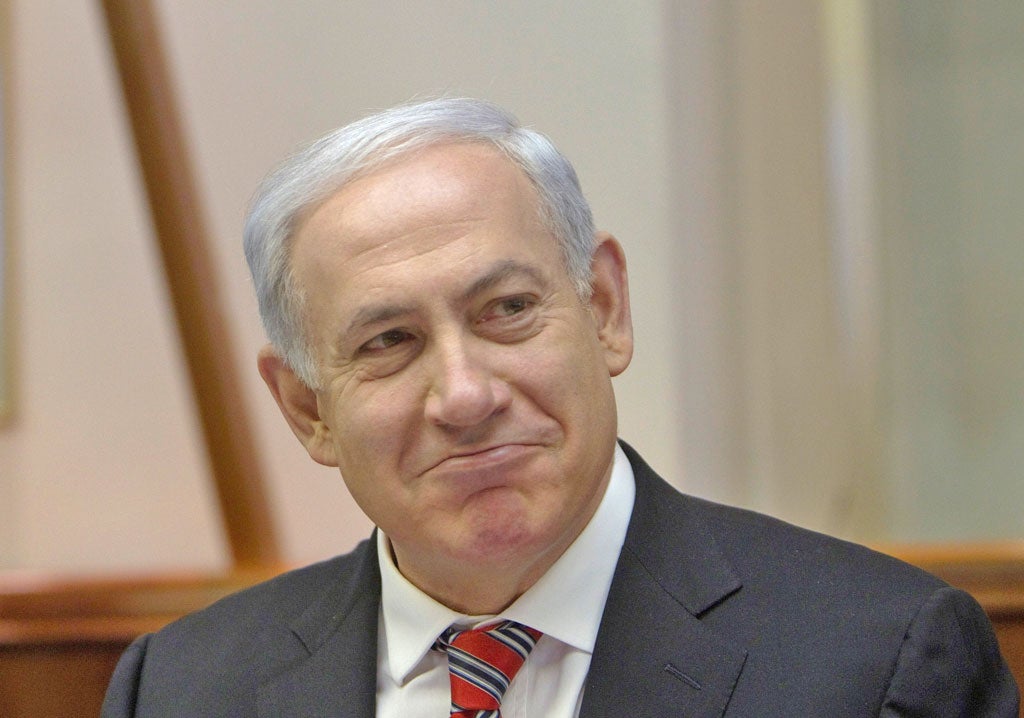Netanyahu eyes early election date as his poll ratings soar
An early election date could have implications for the timing of any pre-emptive strike on Iran

The Israeli Prime Minister, Benjamin Netanyahu, will go into the next general election with a virtually unassailable lead amid reports that it will be brought forward a year to September.
Taking advantage of a weakened opposition, and his own popularity, Mr Netanyahu is expected to announce on Sunday that election will be held on 4 September, more than a year ahead of the October 2013 scheduled date.
Besides heading off a series of conflicts that could threaten the stability of Mr Netanyahu's right-wing coalition, an early election could have implications for the timing of any pre-emptive strike on Iran's nuclear facilities, most likely delaying an attack until the autumn at the earliest.
According to a poll published in Haaretz newspaper yesterday, 48 per cent of people support Mr Netanyahu, who heads the generally hawkish Likud party, as prime minister, putting him far ahead of his nearest rival, and in front of all the other party candidates.
His closest rival is Shelley Yachimovich, who leads the resurgent Labour party, with 15 per cent support. The ultra- nationalist Foreign Minister, Avigdor Lieberman, who leads Yisrael Beitenu, would garner 9 per cent support, and Shaul Mofaz, the newly elected leader of the centrist Kadima party, trails with just 6 per cent.
A parallel poll in the daily Maariv showed that Likud would win 31 seats in the 120-seat Knesset, up from the 27 it currently holds, with Labour at 18 seats, up from 13.
The decision to hold an early election comes as a surprise for some, given that Israel's coalition government is one of the most stable in years. The last time that an Israeli government served out its full four-year term was under Menachem Begin between 1977 and 1981. But the premier faces a number of domestic challenges in coming months that could potentially dent his popularity and damage his party.
Among the most pressing of these is the looming expiry of the Tal Law, which exempts Israel's ultraorthodox Jews from mandatory army service. Mr Lieberman, a kingmaker in the current coalition, has called for a review of the law, pitting his secular Yisrael Beitenu against the powerful religious parties.
Some secular politicians hope that Mr Netanyahu will use his popularity to form a broader national unity coalition that is less in thrall to minority religious and right-wing parties, and which will encourage him to focus on the stalled Israeli-Palestinian conflict, an issue that has largely been pushed off the political agenda.
Israeli commentators speculated that the timing was also dictated by upcoming US elections with Mr Netanyahu eager to secure a popular mandate before the polls open in November, potentially giving President Barack Obama a second term.
Noting the antipathy between the two men over the peace process and Iran, the Israeli commentator Ari Shavit wrote in Haaretz: "If Obama wins in November, he will immediately crush the Israeli Prime Minister who dared to defy him. As a result, by December the right-wing government might already be feeling the pain."
Analysts say that early polls mean that the Israeli government will almost certainly delay any strike on Iran until after the elections, given the risk of failure, with some suggesting that Mr Netanyahu may use the two-month window between Israeli and US elections to strike. Washington has urged Israel to exercise restraint over Iran, arguing that diplomacy and sanctions require time to work.
Join our commenting forum
Join thought-provoking conversations, follow other Independent readers and see their replies
Comments
Bookmark popover
Removed from bookmarks